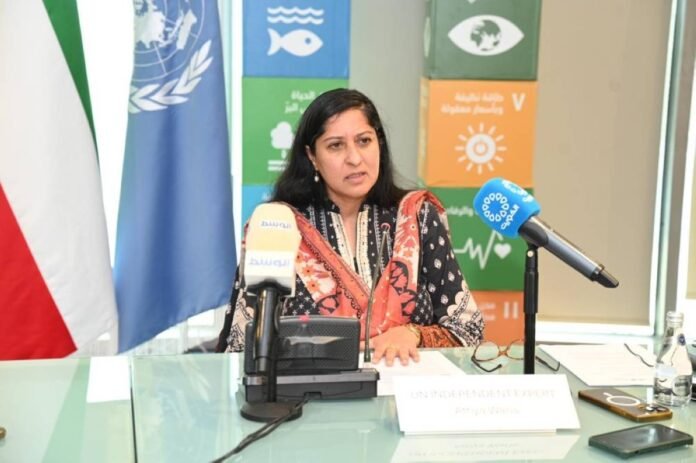Kuwait citizen support received high praise from the United Nations’ Independent Expert, Attiya Waris, during her visit to the country. She described Kuwait’s social welfare system as “one of the most generous in the world.” Waris highlighted the country’s extensive investment in its citizens while encouraging careful fiscal reform.
Waris visited Kuwait from October 1 to 8, 2025, at the invitation of the State authorities. At a press conference on Wednesday, she presented preliminary findings from her official mission. Her research examined how Kuwait’s rentier economy affects both domestic human-rights fulfillment and the country’s international obligations under the International Covenant on Economic, Social, and Cultural Rights.
She commended Kuwait for its commitment to social protection. “Kuwaiti nationals may be some of the best looked-after citizens in the world,” she said. “The support they receive from the state is incredible. I hope citizens recognize and appreciate this.”
Waris pointed out that Kuwait’s public-sector-driven welfare system is both a strength and a vulnerability. Over 85 percent of citizens work in the public sector, benefiting from high salaries, generous benefits, and shorter working hours. While this ensures social stability, it also limits productivity and private-sector growth. The country faces a projected deficit averaging 8.9 percent of GDP from 2025 to 2028, potentially rising to nearly 14 percent in 2025–2026.
She stressed that citizens should now contribute more actively to the economy. “All of this support has built people to a very high extent. It’s time to let them fly,” Waris said. Her suggestion includes gradually restructuring the system to encourage societal contributions back to the state.
Waris also emphasized the role of Kuwait’s large expatriate population, which makes up more than 60 percent of residents. She advised keeping income circulating locally rather than sending it abroad through remittances. “For money to be useful, it must be used within the economy,” she explained, adding that affordable services and entertainment for lower-income workers could strengthen social cohesion.
Acknowledging Kuwait’s National Development Plan and the UN 2030 Agenda, Waris praised efforts to expand non-oil sectors and improve living standards. She encouraged investment in youth skills, entrepreneurship, and structured taxation systems that enhance public trust and transparency.
Kuwait remains one of the least indebted Arab nations, with public debt projected at 7.3 percent of GDP in 2025. Waris highlighted the importance of responsible borrowing and fiscal transparency to protect living standards. She also praised Kuwait’s Zakat and development funds for fostering social cohesion and international solidarity.
Overall, Kuwait citizen support reflects the country’s strong commitment to its population while offering opportunities for sustainable economic development and inclusive growth.


